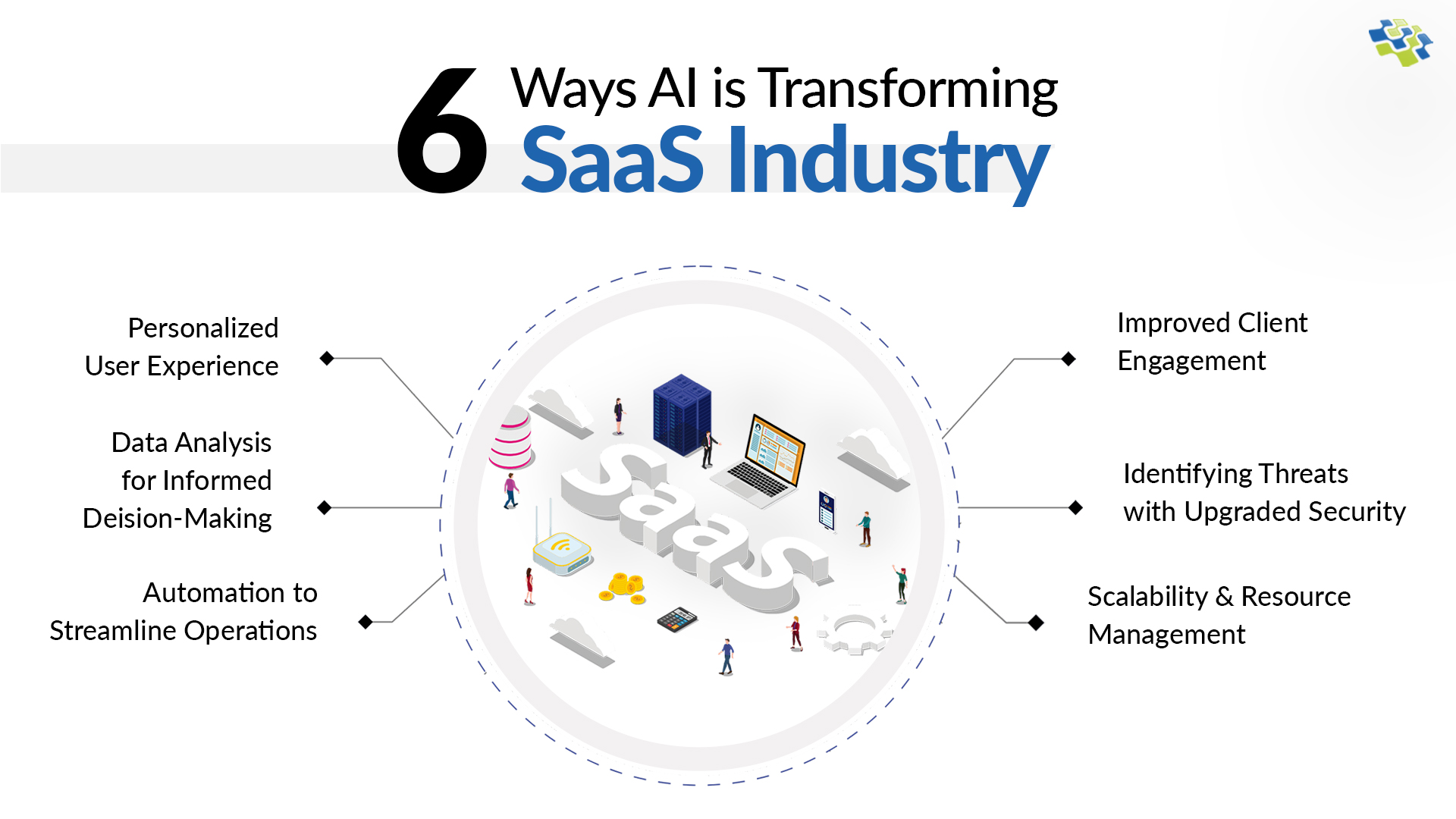AI SaaS Landscape: 6 Ways AI is Transforming the SaaS Industry
This underscores the profound impact of AI SaaS integration, as businesses increasingly harness AI’s potential benefits for enhanced efficiency and productivity. As the synergy of AI SaaS unfolds, it signifies a pivotal stride toward technologically refined and impactful solutions.

“SaaS companies continually strive to surpass competitors and provide customers with outstanding value in today’s fiercely competitive business environment. AI SaaS is becoming a disruptive technology that might fundamentally alter how these businesses run.”– Forbes
Role of AI in SaaS
Artificial Intelligence (AI)’s influence on Software as a Service (SaaS) product development has grown rapidly in the last five years. SaaS, an innovative software delivery model hosted on the cloud, boasts advantages in expenses, usability, and business scalability. AI SaaS is nascent emerging at a faster rate than imagined before. Organizations are recognizing its vast potential. SaaS solutions leverage Artificial Intelligence to furnish personalized services, augment functionality, and enhance performance, promising an enriched user experience grounded in intelligent data-driven decisions. Artificial Intelligence improves SaaS offerings by giving customers access to innovative features. Artificial Intelligence finds several uses in SaaS product development, augmenting the overall capabilities of the program.
- Customer Support: Customer service, pivotal for companies irrespective of size or industry, is empowered by AI SaaS. Automated chatbots driven by Artificial Intelligence streamline SaaS operations, promptly assisting clients, and directing them to optimal solutions without human intervention.
- Efficiency: Artificial Intelligence optimizes processes, increasing efficiency for businesses. Automation powered by AI enhances productivity, eliminating the need for manual and tedious operations.
- Enhanced Functionality: Leverage Artificial Intelligence in SaaS development for adaptive user experiences. Integrate robust features to analyze target audience behavior, dynamically modifying app interactions. This ensures personalized and effective user engagement through intelligent mapping of user preferences.
SaaS and Machine Learning
AI in SaaS is increasingly prevalent, with machine learning poised to surge from a $7 billion global market in 2020 to $30 billion by 2024. This growth facilitates streamlined SaaS app onboarding automation and infusion of intelligence. AI-driven chat operations, automated customer service responses, and predictive modeling enhance user experiences by minimizing input requirements for task completion. The expansion of Artificial Intelligence in SaaS heralds a transformative era, elevating efficiency, and user satisfaction.
Further Read: Why do Businesses Need an AI Strategy to Succeed
AI SaaS: 6 Ways AI is Transforming the SaaS Industry
Artificial Intelligence SaaS integration offers diverse enhancements for SaaS companies, optimizing operations, fostering product innovation, and delivering heightened value to consumers. Key applications encompass a spectrum of operational improvements and customer-centric innovations.
1. Automation to Streamline Operations
AI in SaaS transforms the landscape by automating tasks in SaaS organizations. With AI SaaS, businesses witness a paradigm shift, exemplified by a 30% reduction in operational costs and a 40% increase in customer satisfaction. Chatbots, powered by AI, efficiently handle administrative tasks, data entry, and customer service, significantly reducing response times and operational costs. This automation empowers human resources for strategic initiatives like innovation. Machine learning, a pivotal AI component, enhances chatbot responses, ensuring a swift user experience. Notably, AI-driven automation streamlines SaaS onboarding, minimizing the need for human intervention. This symbiosis of Artificial Intelligence and SaaS not only addresses distance-related challenges but also enhances user satisfaction.
2. Data Analysis for Informed Decision-Making
Data is used as a key ingredient by SaaS companies to gain deep insights. AI-powered analytics handles massive datasets, giving businesses the ability to make decisions based on facts. In a marketing SaaS platform, Artificial Intelligence evaluates user interaction data, enabling real-time optimization of campaigns based on performance metrics. Moreover, Artificial Intelligence SaaS organizations gain a competitive advantage through early trends and anomaly detection, allowing swift responses to evolving client demands and market dynamics. This strategic integration of AI amplifies the efficiency of data analysis, positioning SaaS enterprises at the forefront of innovation and adaptability in the ever-evolving landscape of technology-driven solutions.
3. Personalized User Experience
AI SaaS applications leverage machine learning algorithms to enhance user experiences by understanding individual behaviors and preferences. Through data analysis, SaaS organizations can offer tailored solutions, improving product development processes. The integration of Artificial Intelligence in SaaS allows providers to identify trends in user behavior, fostering a more intuitive and responsive user interface. This data-driven approach not only increases user satisfaction but also contributes to increased sales and retention rates. By harnessing the power of AI SaaS, companies can unlock valuable insights, optimize their offerings, and provide a more personalized, efficient, and competitive service to their clients.
4. Improved Customer Engagement
Artificial intelligence offers substantial benefits for small and medium-sized enterprises (SMEs) in customer engagement. A new wave of vendors utilizes machine learning to enhance marketing, sales, and customer service operations, redefining customer interaction strategies. The integration of AI has proven instrumental in optimizing how businesses engage with their customers. This technology enables a new generation of companies to leverage data-driven insights, transforming and refining customer-centric processes. Through the application of AI in marketing, sales, and customer service, SMEs can elevate their customer interactions, fostering improved relationships and operational efficiency.
- Personalized communications increase customer engagement.
- Automated customer service leads to higher satisfaction levels.
Moreover, these technologies are adaptable to various communication solutions.
5. Identifying Threats with Upgraded Security
The future of cybersecurity hinges on Artificial Intelligence (AI), given its unparalleled capacity to swiftly analyze vast datasets, recognize intricate patterns and continuously learn from experiences. AI’s tireless and unbiased nature makes it adept at identifying automated cyber threats promptly. This proactive approach immediately detects suspicious activities, notifying security teams to address potential issues preemptively. Particularly crucial in high-stakes sectors like healthcare with electronic health records, AI ensures the highest level of data security. SaaS companies benefit immensely from AI, rapidly enhancing their security posture by swiftly identifying and responding to threats.
- AI’s adaptive capability allows it to autonomously recognize and counter-evolving attack methods without human intervention.
- AI SaaS revolutionizes threat detection and response in real time.
- SaaS companies leverage AI’s adaptive learning to prioritize and address vulnerabilities efficiently.
Furthermore, Artificial Intelligence aids in pinpointing and prioritizing vulnerabilities, and streamlining security management for SaaS companies by self-learning and adapting to emerging threats over time.
6. Scalability and Resource Management
Artificial Intelligence leverages usage trends to dynamically allocate resources, ensuring optimal efficiency for SaaS systems. Through AI-driven algorithms, SaaS application architecture automatically scales in response to workload and demand. This proactive resource management ensures cost-effectiveness and facilitates effective growth for SaaS companies. The Artificial Intelligence SaaS framework ensures that even during peak demand, the system operates at peak performance, providing users with a seamless experience. This intelligent approach to resource allocation enables SaaS companies to achieve optimal functionality, translating to enhanced user satisfaction and sustained operational excellence.
AI SaaS Key Challenges and Ethical Considerations
Integrating AI tools into SaaS solutions offers substantial organizational benefits. However, addressing challenges and ethical dilemmas arising from AI SaaS implementation is essential. Examining specific examples allows for a comprehensive understanding of potential issues and the development of effective solutions.
- Bias: In Artificial Intelligence SaaS, biased algorithms may yield unjust outcomes, posing a significant concern. Particularly in applications like hiring or loan processing, biased algorithms can lead to discriminatory results, disproportionately impacting underprivileged groups. Addressing algorithmic bias is crucial for fair and equitable SaaS solutions.
- Accountability: The complexity of AI algorithms poses challenges in holding businesses accountable, especially in SaaS applications like autonomous vehicles. In instances of mishaps, understanding these intricate algorithms becomes crucial for attributing responsibility, a matter of utmost importance due to potentially catastrophic consequences.
- Data Privacy: AI systems, particularly in SaaS applications like healthcare, demand substantial data for efficient training. This poses privacy concerns, necessitating transparent data practices. SaaS companies employing AI for user data analysis must adhere to robust security measures, ensuring openness and honesty in acquiring and safeguarding sensitive patient information.
SaaS companies can ensure ethical Artificial Intelligence practices, fostering user trust and long-term success. Proactive measures to address moral concerns contribute to the reliability and responsible use of AI-powered products.
Further Read: How Artificial Intelligence (AI) Is Impacting Supply Chain Management
Develop Your AI SaaS Solutions with NextGen Invent
Gain a competitive edge for your SaaS product using Artificial Intelligence. As businesses recognize AI’s unique capabilities, integrating it into SaaS operations becomes imperative for unlocking the full potential of products and services. The diverse applications of AI, from general purposes to addressing specific challenges, make it a pivotal technology in the SaaS landscape. To harness the benefits of AI in your SaaS company, consider partnering with NextGen Invent, a leading AI app development company. Explore the extensive possibilities of Artificial Intelligence SaaS solutions with our expertise, ensuring your business stays at the forefront of innovation.
Boost your SaaS company with NextGen Invent’s innovative Artificial Intelligence solutions. Contact us today, and let’s discover the real value Artificial Intelligence can bring to your SaaS business.
Stay In the Know
Get Latest updates and industry insights every month.

